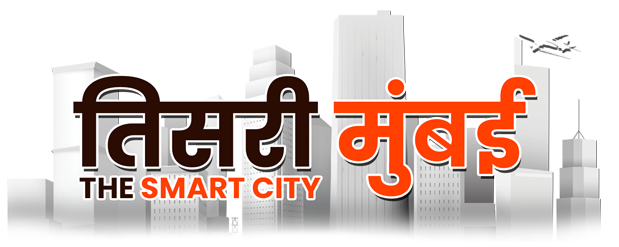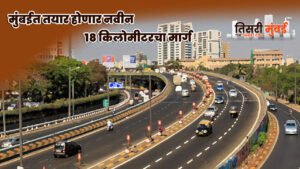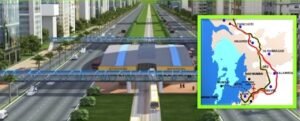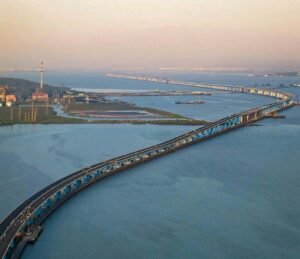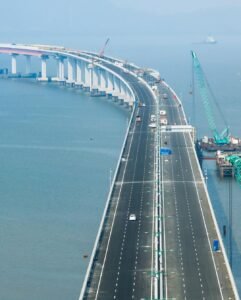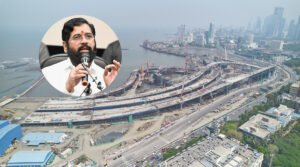This city has been proposed to further boost economic activity and contribute to the country’s GDP. “There is a plan to develop a second BKC in Kharghar. Around 150 hectares of land is expected to be available for developing it into a purely commercial area that would attract both Indian companies and MNCs – “Third Mumbai.”

Mumbai: With an aim of providing better housing, infrastructure and robust transport facilities to the growing population of the Mumbai Metropolitan Region (MMR), the state government has finalised a broad skeletal proposal for developing a new city called the ‘Third Mumbai’.
The city is proposed around the Navi Mumbai International Airport which will be linked to Mumbai by the crucial connector Atal Bihari Vajpayee Sewri-Nhava Sheva Atal Setu, also known as Mumbai Trans Harbour Link (MTHL).
Sources from the state government confirmed that last week, this proposal was given a go-ahead.
The Mumbai Metropolitan Region Development Authority (MMRDA) is expected to get the mandate for reshaping the far ends of MMR for which a body called New Town Development Authority (NTDA) has been formed. Parts of Ulwe, Pen, Panvel, Uran, Karjat and surrounding regions encompassing an area of 323 sq.kms will be part of NTDA.
There will be around 200 villages, including 80-90 villages coming under the Navi Mumbai Airport Influence Notified Area (NAINA) that are likely to be part of NTDA.
“We are calling it the Third Mumbai which will have all the necessary infrastructure that a well-developed city should have. From residential (luxury and affordable), commercial complexes, data centres, hubs for MNCs and banks, and financial companies to large knowledge parks; it will have everything. A robust public transportation shall also be developed there,” said a government official.
This city has been proposed to further boost economic activity and contribute to the country’s GDP. “There is a plan to develop a second BKC in Kharghar. Around 150 hectares of land is expected to be available for developing it into a purely commercial area that would attract both Indian companies and MNCs,” said a government official.
The government already has plans to develop MMR that will generate potential to touch a USD 0.25 trillion economy. Mumbai city covers approx 600 sq kms of area, Navi Mumbai around 344 sq kms while Naina is on 370 sq kms area with 174 villages.
Sources said that the MMRDA and the country’s planning agency of NITI Aayog are jointly working towards taking measures to raise Mumbai’s gross domestic product from the existing $140 billion to $300 billion by 2030, of which the proposed Third Mumbai is an important part of the same. An economic masterplan for MMR is also being prepared.
Both the MTHL and Navi Mumbai International Airport are further expected to boost India’s GDP by 1 percentage point. The proposed airport is expected to open next December which will not only alleviate pressure on Mumbai airport but also enhance regional connectivity. The first phase is expected to handle 20 million passengers annually.
Meanwhile earlier last month in a discussion organised by the MMRDA, the need to evolve newer areas around Mumbai for economic and commercial activities was discussed. However, the developers are having a contention that the opportunity for affordable housing is getting circumvented as in the case of Naina due to exorbitant development charges.
“There is a need for MMRDA to focus on the MMR rather than only planning public infrastructure in Mumbai. When MMR is developed with residential and commercial spaces; only then crowds inside suburban local trains will reduced,” said AV Shenoy, a member, of Mumbai Mobility Forum.
In a bid to strengthen public transportation, a new Panvel-Karjat suburban rail corridor has been planned by Mumbai Rail Vikas Corporation at a cost of ₹812 crore. “The work on this double rail line is underway with physical completion of 43% and the estimated time for completion is December 2025,” said an official from MRVC.
The rail project involves three tunnels and two rail flyovers covering five railway stations, including Panvel and Karjat. The MRVC officials said that 57 hectares of private land have been acquired, besides 4.4 hectares of government land. The project also needs 9.13 hectares of forest land for which permissions are required.
The MRVC has also begun the work of building stations at Panvel, Chikhale, Mohape, Chowk, and Karjat. The new corridor will connect Navi Mumbai with the Raigad district of MMR. It will also act as a catalyst for the development of Panvel, Karjat, Naina, and the proposed NTDA. It will allow local trains to run between Mumbai and Karjat via Panvel.
